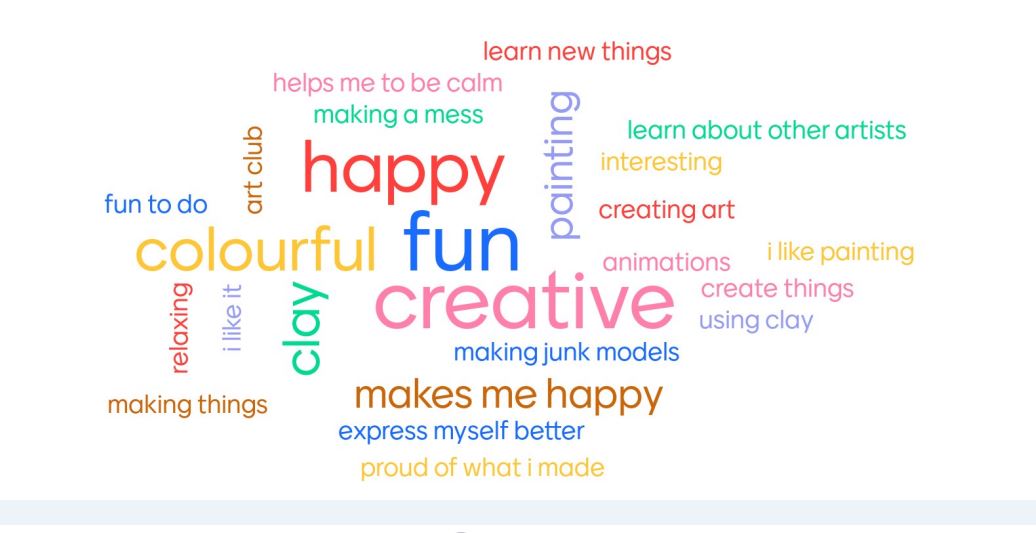Latest News:
INTENT
At Pendle Community High School, the Art curriculum is designed to engage, inspire and challenge, equipping pupils with the knowledge and skills to experiment, invent and create their own works of art, craft and design. It provides visual, tactile and sensory experiences and a special way of understanding and responding to the world. Lessons enable pupils to communicate what they see, feel and think through the use of colour, texture, form, pattern and different materials and processes which helps develop emotional expression and communication. All pupils will be supported to produce creative and imaginative work and become involved in shaping their environments through art and design activities. They learn to make informed judgements about aesthetic and practical decisions. Pupils explore their ideas and record their experiences, as well as evaluating creative ideas of their peers, other artists, craft makers and designers. The curriculum explores how art and design both reflect and shape our history, and contribute to the culture, creativity and wealth of our nation. The Art curriculum is broad and balanced with cross curricular links, sets high expectations and is designed to provide appropriate challenge to all pupils.
IMPLEMENTATION
Art & Design at Pendle Community High School is based around different topics that develop and extend pupils artistic abilities. Art is sequenced to enable pupils to use and build on prior learning and knowledge, and to continually develop key skills.
Each Key Stage focuses on different themes to ensure continued interestin the subject as well as acquiring new knowledge. The sequence of lessons for each topic, offers opportunities to develop and progress skills and knowledge. All topics develop pupils’ artistic techniques including their fine motor control and use of equipment, utensils and media. Pupils develop their use of materials, with creativity, experimentation and an increasing awareness of different kinds of art, craft and design.
All topics last for a full term. Each topic also comes with an overview and list of resources to give any teacher leading art confidence in how the skills should progress, the knowledge that should be taught and the curriculum outcomes that should be achieved.
Designing and creating, analysing and evaluating are common aspects in the Art curriculum and pupils will achieve this by being supported to
- research via the internet and art books to plan and formalise ideas for a piece of art,
- explore existing artworks,
- discuss likes and dislikes,
- plan how long a process is going to take.
- decide which equipment and media to be used,
- select appropriate processes to create the desired outcome,
- use equipment safely and in the correct manner,
- experiment with processes,
- use a range of machinery such as light boxes, potter’s wheel etc.
- critically analyse the finished product and that of others.
- discuss outcomes and explore what could be done in future projects.
- make amendments to finished product to complete
For Independent learners the curriculum is designed to provide challenge and all activities will be appropriately matched for individual learning, as well as encouraging problem solving and discovery of art in the environment. Independence skills will be further developed throughout art sessions by ways of collecting and putting away equipment, independent research and development of ideas personal to the individual.
Supported and experiential learners follow a thematic approach, where many areas of the curriculum are connected and integrated within a theme. These classes work in smaller groups whose learning is met primarily through experiences and activities which are multi-sensory and stimulate learning through kinaesthetic approaches and are supported through structure and routines. This curriculum is used to enhance early learning and development in pupils across school who present with sensory issues and those who learn best via a highly experiential, multi-sensory approach.
The school environment further supports learners in retaining subject knowledge through a dedicated Art wall, displaying various artists and their works and all school corridors and classrooms have display boards which showcase the pupils artwork in various subject areas.
IMPACT
As a pupil progresses through the school, they develop an understanding and appreciation of art and design. The skills and knowledge taught in Art are transferable and support pupils to do more and engage more in other curriculum areas. Teachers have high expectations and evidence of this is demonstrated in progress data and KS4 accreditation results. Impact is also recognised in a variety of ways such as pupils’ art pieces, evaluative discussions, enthusiasm in lessons, willingness to try new techniques, proudly showing their work to others and beginning to use technical vocabulary. Pupils will demonstrate more confidence in analysing their work and giving their opinion on their own and other works of art. Pupils may show improved resilience and perseverance by continually evaluating and improving their work. Pupils will also demonstrate increased confidence and proficiency in a variety of techniques including drawing, painting, sculpting, as well as other selected craft skills, e.g. collage, printing, weaving and patterns.
All pupils in school will be able to join in the creative process at a level appropriate to their needs and some may be able to speak confidently about their art and designwork and how their skills have developed over time. Being able to appreciate and enjoy visual arts enriches all our lives.
Pupils further develop their abilities in the 4 key components of the curriculum The depth of knowledge and proficiency in skills that pupils will attain will vary but all will demonstrate progress from their individual starting points.
Pupils will have also learnt about careers and related work opportunities that are accessible for them in the local and wider community. This is enhanced by visiting artists, craftsmen and designers to school and educational visits which provide opportunities for further relevant and contextual learning.
Art Lead
Shelley Plant
splant@pchs.lancs.sch.uk
Pupil Voice: Why we think it is important to learn about art in school.

CONTACT US
Pendle Community High School & College
Pendle Vale Campus, Oxford Road, Nelson, Lancashire, BB9 8LF
Tel: 01282 682260
Headteacher: Debra Grogan
Chair of Governors: Trevor Ashton (Address c/o above)
Receptionist: Sophie McCamon
E-mail: smccamon@pchs.lancs.sch.uk
SENDCO: Stephanie Curtis
Email: scurtis@pchs.lancs.sch.uk
CONNECT WITH US
Paper copies of the information on our website can be requested via email.

